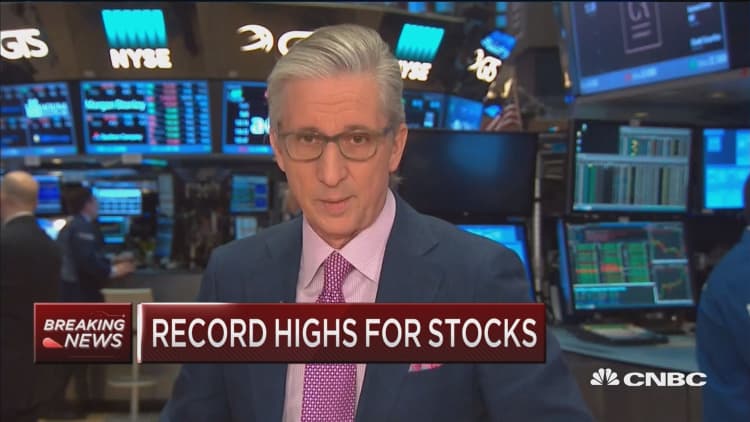
Home Depot is at another historic high on Tuesday following its excellent earnings report, but a major factor behind its stock price rise has been dividend hikes (it raised its dividend 29 percent on Tuesday), and an aggressive buyback program, including the new $15 billion share buyback program that it also announced.
To give you an idea of just how big a $15 billion buyback is, the company's market cap is roughly $175 billion, so we are talking about buying back nearly 9 percent of the company.
Even by the standards of the last decade, that is a big buyback.
Home Depot is part of a select group of companies I call "buyback monsters," companies that have bought back more than 25 percent of their shares since 2000.
Why 2000? Because most companies hit their highest levels of shares outstanding between 2000 and 2006; since then, most companies have been reducing share count, in some cases aggressively.
Consider Home Depot. In 2003, they had 2.36 billion shares outstanding, according to Factset. Today, they have 1.21 billion shares outstanding.
That is half the shares they had outstanding 14 years ago.
All other things being equal, that means earnings are twice as high as they would have been in 2003, when there were twice as many shares outstanding.
Home Depot isn't alone. IBM had 1.9 billion shares outstanding in 1997, today it has about 950 million, again less than half what it had 20 years ago.
ExxonMobil had 7 billion shares outstanding in 2000, today it has 4.1 billion, a reduction of about 42 percent.
This is not a trend that is limited by any one sector. There are companies that have been aggressively reducing their share counts in Industrials, Technology, and Consumer:
Industrials: share count reductions
Northrup Grumman: 50 percent since 2003
CSX: 29 percent since 2000
3M: 25 percent since 2000
United Technologies: 25 percent since 2005
Technology: share count reductions
Microsoft: 30 percent since 2004
Intel: 30 percent since 2001
Cisco: 32 percent since 2001
Consumers: share count reduction
Gap: 55 percent since 2005
Bed Bath & Beyond: 50 percent since 2005
McDonald's: 36 percent since 2000
Disney: 27 percent since 2006
Procter & Gamble: 24 percent since 2005
Source: Factset
Why are there buybacks at all? They were originally used to support the issuance of stock options. The options increased the share count outstanding, so to keep the count down the company bought back shares.
But as the opportunity for significant top-line growth waned, buybacks to reduce share counts became a separate strategy to prop up earnings growth.
And that's my beef: Buybacks are a form of financial engineering. Here's another problem: It's not at all clear that buying companies just because they are buying back shares will be a successful investment strategy.
Take IBM — despite being one of the most aggressive buyback monsters on the Street, you can't say IBM's stock price has soared in the last decade. In 2014, the company eased off a bit on its buybacks, and the stock headed south.
It headed south because IBM was beset by fundamental growth issues: Its revenues from its old line businesses were shrinking and there was notrevenue from nascent businesses (like Watson and artificial intelligence) replacing it.
The lesson: No amount of financial engineering like buying back shares can replace management's inability to grow the business.
Not surprisingly, there are ETFs for all this, but their performance has been spotty. ThePowerShares Buyback Achievers ETF (PKW) tracks a market-cap-weighted index of companies that repurchased at least 5 percent of their outstanding shares in the previous 12 months. Top holdings include McDonald's, Boeing, and QUALCOMM.
It has slightly outperformed the S&P 500 in the last year, but it has underperformed the S&P 500 by about 6 percentage points over a two-year period.
So just reducing shares doesn't necessarily mean that companies will outperform. A better approach might be that taken by the AdvisorShares Wilshire Buyback ETF (TTFS), which uses a "smart beta" approach that screens not just for reduction of shares but also free cash flow, and no increase to leverage.
The TTFS has outperformed the PKW by about 9 percentage points in the past two years.
Do not expect buybacks to go away. Buybacks could become an even bigger business, if the whole business of tax reductions become a reality. Billions could be repatriated from overseas, and most strategists believe that a large amount of that money could find its way into buybacks.


